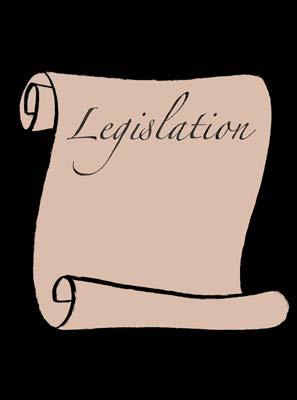
4 minute read
How New Legislation Passed Will Affect Students
The six most impactful legislation passed this school year by the Senate of College Councils
Writer Jessica Lenamond Designer Kellie Woodin
Advertisement
Each academic year the Senate of College Councils passes legislation that directly affects UT Austin students to bring change to campus. The Senate consists of 22 college councils that represent the needs of students and provide student opinions on academic issues to the University's administration for implementation. But outside of students that are directly involved with Senate, many students are not aware of what legislation was recently passed and how it will affect their academic and personal experience. To help students better understand future changes to campus, this article highlights the six most impactful legislation passed this year.
There are a few key steps to understanding how legislation is created and then passed, failed, or tabled in Senate and then eventually implemented into student life. First, a resolution is written when a systematic academic challenge is identified for students, and research is done to support the resolution. The Senate representative in each college’s council usually writes the resolutions, but anyone from a council, Student Government, Senate, or Graduate Student Assembly can create a resolution. If a student is not in any of these groups but still wants to present legislation, they can directly contact someone from one of these groups to work with.
Once written, the legislation is presented to Senate and then to each college’s council. Once each council votes to pass, fail or table a piece, the Senate representative will take that vote back to Senate for questions and a final count of votes from the councils. Only council members in Senate can have the final vote on legislation and it passes if it reaches a majority vote. There are three types of legislation written: Joint Resolution (J.R.), Senate Resolution (S.R.), and Senate Bill (S.B.). A J.R. is a resolution in support of a change to campus signed by Senate, Student Government, or the Graduate Student Assembly. A S.R. is a resolution in support of change to campus but is only signed by Senate. A S.B. only applies to amendments to Senate’s constitution.
Even after legislation passes, it still must be implemented on campus so that students can experience the benefits of the legislation. In order to implement the legislation, the writers and council must coordinate with administration and faculty to actively create the change supported in the resolution and help students as quickly as possible.
If you want to become more involved in making changes that directly impact the student body, consider connecting directly with your college’s council and its Senate representative. The representative is there to find resolutions to issues that students face and can assist in writing legislation. Student Government and Senate are also always looking for students passionate about change and policy and Senate meetings are open to the public every other week during the school year. For updates on legislation passed, visit Senate’s website.
Most impactful legislation passed by the Senate of College Councils in 2019-2020
J.R. 1901: A Joint Resolution in Support of Granting Students Excused Absences from Class to Vote During Election Days
How it affects students once implemented:
Students will be granted an excused absence from class to vote on election day for city, state and federal elections. Students will scan a QR code at the voting station that will notify their professor that they voted. This policy also extends to Teaching Assistants, Instructor Assistants, Graduate Assistants and any other graduate student worker.
J.R. 1904: A Joint Resolution in Support of Putting Menstrual Products in Women’s and Gender Neutral Restrooms
How it affects students once implemented:
Menstrual products will be available in all women’s and gender neutral restrooms in on-campus academic buildings.
J.R. 1907: A Joint Resolution in Support of Increasing the Accessibility of Full-Time Private Advocate Employees
How it affects students once implemented:
More full-time private advocates will be hired by the Title IX Office and the Office of the Dean of Students to give students more access to an essential university resource for survivors and students affected by sexual assault and/or misconduct.

S.R. 1908: A Resolution in Support of Creating a Student Bereavement Leave Policy
How it affects students once implemented:
Students will be allocated a minimum of 3 days after the loss of an immediate family member or loved one for bereavement activities without facing penalties for class absences. Before S.R. 1908 was passed, professors could individually decide how to handle absences and assignments for students facing familial loss. The Office of Student Emergency Services will require students to provide some sort of documentation before receiving accommodations, such as copies of death certificates, obituaries, and letters from funeral directors.
S.R. 1910: A Resolution in Support of Enforcing that Professors Disclose Resource Purchases on Course Schedules
How it affects students once implemented:
Students will know exactly what supply purchases are required for a course before they register for the class. Professors must submit additional fees and supplies purchases for approval and disclose all purchase requirements on the Course Schedule.
S.R. 1912: A Resolution in Support of Modifying the Internal Transfer Application Process
How it affects students once implemented:
The internal transfer application process will be standardized across the entire university to make transfer navigation much easier for students, advisors, and administration. Currently, each college has its own application and timeline for this process.
Balanced on a thicker knife’s edge. Balanced on a thicker knife’s edge.












